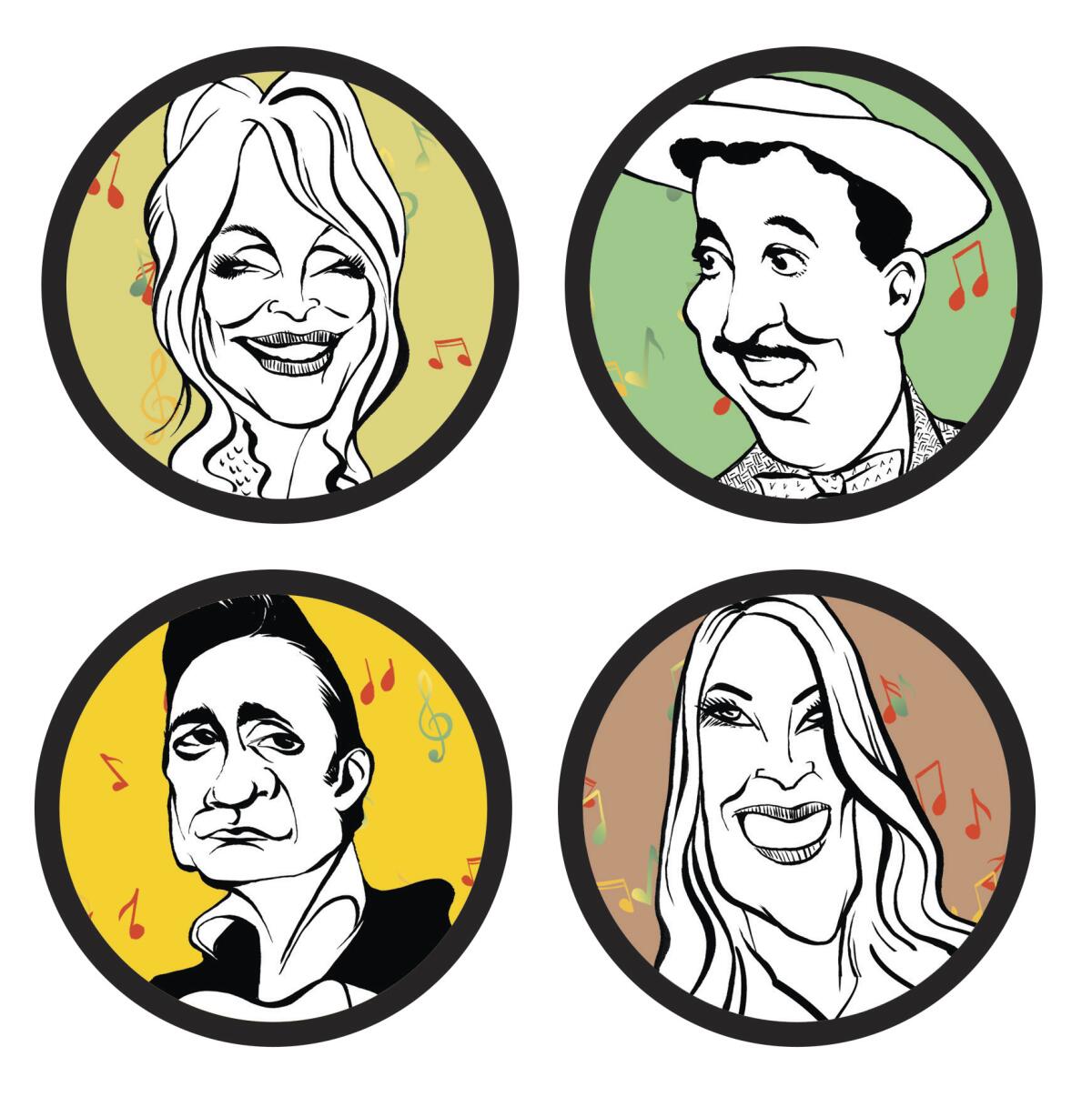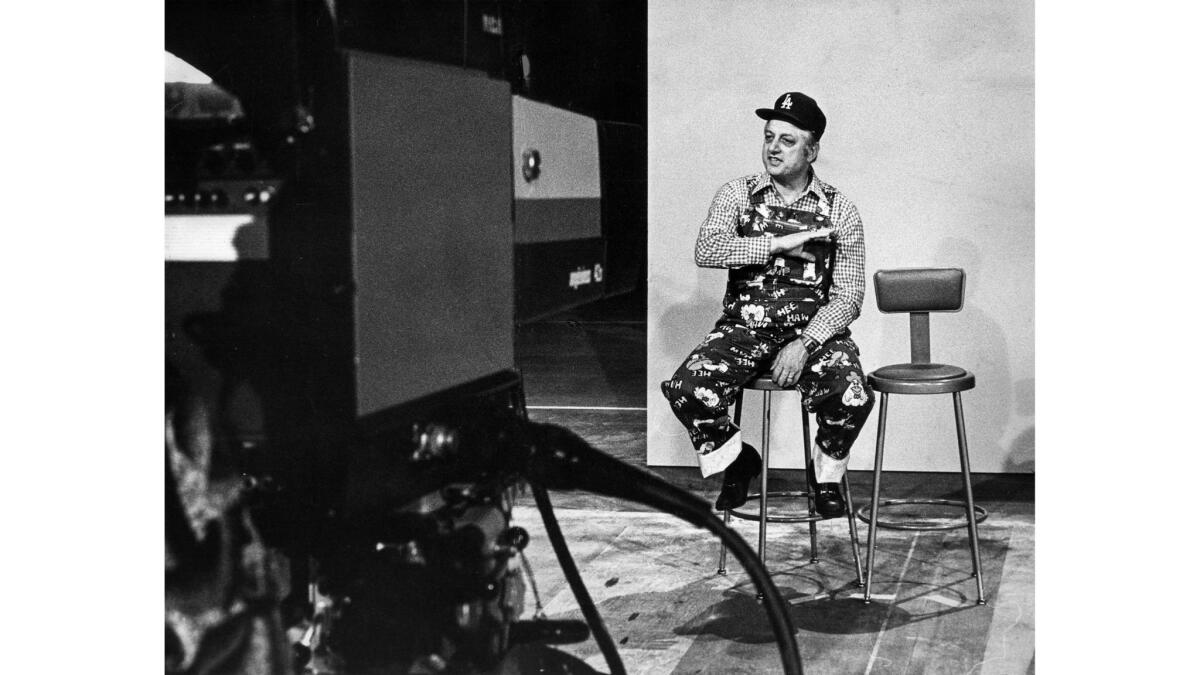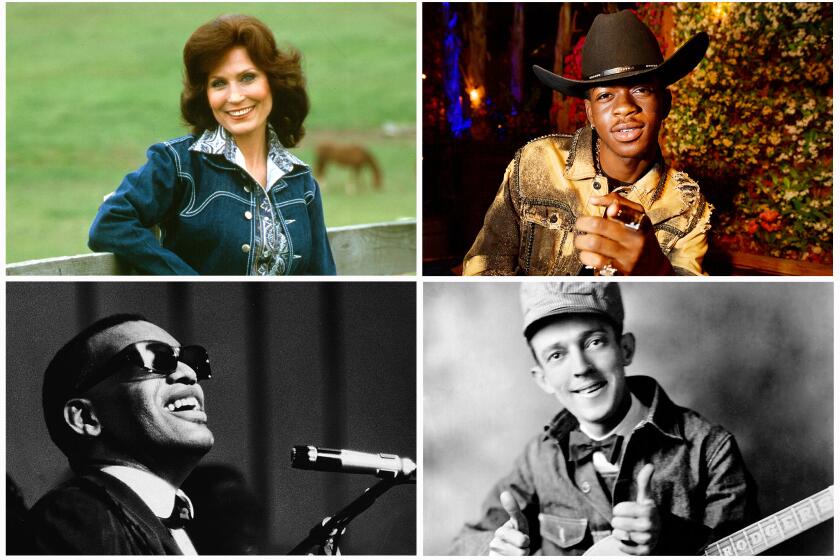On TV, country is the soundtrack to the American dream

- Share via
Pop culture will find you, whether you look for it or not.
It fascinates me to think that my parents, because they were alive in the late 20th and early 21st centuries and went to movies and watched television, had some knowledge of hip-hop and EDM, of hard rock and winsome pop ballads that really let you feel the scene in which the heroine decides to change her life. Their own tastes ran to Oscar Peterson and Ella Fitzgerald; modern pop music was in their heads, if not their hearts.
Still, you never know what’s going to stick.
Whatever your musical interests, you can’t have lived in America during the last nine or 10 decades without getting a fair notion of country music, in one or more of its many forms — how it sounds, what stories it tells, what it looks like, even. Maybe you liked it already; maybe you got to like it. As related in Ken Burns’ latest mega-documentary, “Country Music,” premiering Sept. 15 on PBS — another beautifully illustrated collection of significant biographies, told with a fondness for pointed ironies — it’s a music driven by modern media. Country might have come out of the hollers and cotton fields and dusty plains, but it was shaped by records and radio, movies and television. (Now it is on your phone.)
“Mr. Robot,” “Creepshow,” “The Crown” and the rest of the 20 new and returning TV shows — on 20 different networks — we’re looking forward to seeing.
Between Burns’ 16-hour recounting; the Netflix anthology “Dolly Parton’s Heartstrings” (Nov. 22), amiably told tales of human folly and enlightenment inspired by her songs; the intimate Lifetime double-biopic “Patsy & Loretta” (Oct. 19), about the friendship between Patsy Cline (Megan Hilty) and Loretta Lynn (Jessie Mueller), directed by “Nashville” creator Callie Khouri; and the first full season of “Bless This Mess,” ABC’s millennial “Green Acres,” we seem to be having a little fall TV hoedown.
Yet country music and country ways have been a part of the medium all along — from “Ozark Jubilee” to “Old Town Road,” from “The Beverly Hillbillies” to “King of the Hill,” from Hank Williams on “The Perry Como Show” to fresh-off-the-iPhone YouTube videos of Parton joining the Highwomen at the Newport Folk Festival. (We could be here for days just discussing Parton’s television oeuvre, which includes musical specials, TV movies, Christmas specials, TV movies that are also Christmas specials and two variety shows under her own name — as well as three appearances on “Hannah Montana” as Aunt Dolly.) You have been soaking in it. It has you surrounded.
Country is the soundtrack to a certain American dream, to powerful stories we tell ourselves about what makes us good, and free, and authentic people — even when we’re only trying, and sometimes failing, to be. Shaped by Hollywood, our own soft-focus view of actual history, the sentimental preoccupations of its lyrics and the musical concerns of its practitioners into sonic shorthand for “tradition” and “integrity,” country music is sometimes just used to sell a truck or a politician — though, conservative associations notwithstanding, it’s not simply a matter of red states or states of mind, as the Burns documentary is at pains to point out. (I give you Willie Nelson, ladies and gentlemen; I give you Jimmy Carter.)
Like that of country music, the history of television (and radio before and alongside it) is both local and national, serving real and virtual communities, the hometown folks and the diaspora. It’s no surprise that country music, with its inherent (and cultivated) friendliness, and television, with its eyes on every audience, have had a long and fruitful relationship.
Ken Burns’ documentary series on the history of country music ends in the ‘90s, but its questions about race and authenticity echo today’s “Old Town Road” debates.
Country music and television have enjoyed a long, close marriage
If you have ever seen “The Beverly Hillbillies,” you’ve heard bluegrass performed by two of the people who helped create it, Lester Flatt and Earl Scruggs; and you might have seen them as well, playing fictionalized versions of themselves. (Jerry Scoggins, whose Cass County Boys performed alongside singing cowboy Gene Autry in movies and on radio and TV, sang the theme.)
You might have encountered Tennessee Ernie Ford on “I Love Lucy,” as Lucille Ball’s country Cousin Ernie, singing “Wabash Cannonball” to his own guitar accompaniment, or “Y’all Come,” with the Ricardos and Mertzes as the Four Hot Chicken Pickers. Ford, best known for his 1955 recording of Merle Travis’ “Sixteen Tons,” would later have his own NBC nighttime variety and daytime talk show; guest host “The Tonight Show”; and make 24 appearances on “Hee Haw,” the corn-pone “Laugh-In.” “Bless your pea-pickin’ heart” was his catchphrase. He has three stars on the Hollywood Walk of Fame.
If you watched “The Andy Griffith Show,” you easily might have heard the bluegrass group the Dillards, who recurred there as the Darlings, or the Kentucky Colonels as the Country Boys, with Griffith joining in on “Whoa, Mule.” Griffith would win a Grammy for his 1996 gospel album, “I Love to Tell the Story: 25 Timeless Hymns”; one of his final screen appearances was as Old Man in the video for Brad Paisley’s 2008 single “Waitin’ on a Woman.”
Waylon Jennings narrated and performed the theme for “The Dukes of Hazzard,” a good-ol’-boys-kicking-up-trouble-in-cars comedy whose country cred was sealed by t the stars that dropped in to sing: Lynn, Johnny Paycheck, Tammy Wynette, Roy Orbison, Dottie West. (That’s not to say it wasn’t ridiculous.) Mike Judge’s dust-dry, barely animated “King of the Hill,” about a Texas propane salesman, featured cameos from Nelson, Wynette, Clint Black, the Dixie Chicks, Charlie Daniels, Vince Gill, Wynonna Judd, Paisley and George Strait.

Hosted by Bakersfield-sound architect Buck Owens and instrumental phenom Roy Clark, “Hee Haw” was popular way beyond its nominal demographic and ran, first on CBS and then in syndication, for years; the jokes and costumes were silly, but the music was solid. There was “The Johnny Cash Show,” which was solid music all the way through. And “The Glen Campbell Goodtime Hour.” And “Donny & Marie,” whose Marie Osmond was a more than a little bit country. (She had four No. 1 hits.) For that matter, there was “The Muppet Show,” which counted among its guests Lynn, Clark, Kris Kristofferson and Rita Coolidge, Roy Rogers and Dale Evans, Crystal Gayle, Kenny Rogers, Roger Miller, Linda Ronstadt and Cash (with Miss Piggy taking the June Carter part on “Jackson.”)
Before and after country went prime time, the music was a fixture on local television and in syndication. Careers began there. By age 10, Parton was on “The Cas Walker Show,” out of Knoxville, Tenn., and through most of her 20s, she was the “girl singer” on the syndicated “Porter Wagoner Show,” during which time her star rose as his... just sort of stayed where it was, like a less tragic, platonic “A Star Is Born.” Parton wrote “I Will Always Love You” as a farewell to him.
Kentucky-born Lynn’s luck turned when she won a televised talent contest — hosted by future “Hee Haw” co-host Owens — in Tacoma, Wash. Later, in Nashville, Tenn., she was featured on the syndicated “Wilburn Brothers Show,” to whose music publishing company she was also signed. Cline’s 1957 performance of “Walkin’ After Midnight” on the nationally broadcast “Arthur Godfrey’s Talent Scouts” made her a star more or less overnight — much as “American Idol” and “The Voice” would launch Carrie Underwood and Cassadee Pope almost half a century later.
On television, ‘country’ is a state of mind
The music implies a world. As pictured over decades of movies and television series, “country” is an imagined, not exactly imaginary place, an audiovisual nostalgic needlepoint sampler of simple pleasures and family values — “Little House on the Prairie” was built there, “The Waltons” too. Holiday specials flourish in that air. In these not completely reliable narratives, country people are more comfortable in their skin, more authentic, closer to the earth and to heaven than city folk. The city is the country, spoiled. (Never mind that some of those springs are polluted.) Sophistication is a sort of sickness. Woodstock became Woodstock because it was on a farm: Get back to the land; get your soul free.
Next to the country bumpkin, the city slicker comes up short. The Clampetts of Beverly Hills may mistake pool cues for “fancy pot passers,” but there is no wiser man in the whole history of television than Buddy Ebsen’s Jed, and no woman more fiercely independent than Irene Ryan’s Granny. Eddie Albert’s Oliver Wendell Douglas, for all his good intentions in Hooterville, is the only frustrated character in “Green Acres” — everyone else knows who they are and how things really work. In the “These Old Bones” episode of Parton’s “Heartstrings,” big city lawyer Ginnifer Godwin is back home in the piney woods, having forgotten those things. Will Kathleen Turner’s old clairvoyant open her eyes? Do you have to ask?
When country characters do scheme, it’s often for purposes of comedy or in response to those foolish enough to take them for fools; they’re scamps. If Yankee bootleggers stood for organized crime, the hillbilly moonshiner is the picture of down-home entrepreneurial individualism. George Jones’ first No. 1 was “White Lightning”: “Well, the G-men, T-men, revenuers, too/Searchin’ for the place where he made his brew/They were looking, tryin to book him, but my pappy kept on cookin’.”
Bad behavior comes with a note of regret (or a comeuppance). With its lyrical roots in folk ballads marked by rape and murder and abandonment and its contemporary tales of disorderly drunkenness and marital infidelity, country music can seem an encyclopedia of wickedness. Find a line anywhere darker than “I shot a man in Reno/Just to watch him die.” (That’s not all there is to it, of course. There are songs about love, and trains, and trucks, and church, and parties, and all sorts of things.)
Cash never did shoot a man in Reno or anywhere else — well, he did kill someone on “Columbo” once — but as Burns’ “Country Music” makes clear, the lives of country singers were often also the stuff of country songs, playing out themes of love and infidelity, faith and faithlessness, sin and redemption, being held down and breaking away. Indeed, some had histories harder or stranger than anything they would ever actually sing about. (Williams, who would not live to 30, is memorably quoted: “There ain’t nobody in this here world that I’d rather have standing next to me in a beer joint brawl than my Ma, with a broken bottle in her hand.”)

“Patsy and Loretta,” with its creative women and problematic spouses, takes on its share of such conflict. (The “Jolene” episode of “Heartstrings,” departing a little from the song, becomes a study in female friendship and empowerment, which are old, necessary country themes too.) The most remarkable thing about “Nashville,” which ran from 2012 to 2016 on ABC and for two more years on CMT, is that no one had thought of it before, given how comfortably the substance of country songs adapt to a prime-time soap opera and how efficiently a prime-time soap opera could become a platform for country music. (“Y’all About Eve,” I called it once.) For a darker — though in its way delightful — take on the country music business, check out the first season of the Cinemax series “Mike Judge Presents: Tales From the Tour Bus,” an animated oral history of dysfunctional behavior by the likes of Paycheck, Jennings, Blaze Foley and the team of Jones and Wynette. Things are thrown, guns shot.
And yet, despite it all, country somehow keeps its place as the most innocent of American musical genres, and country folk their status as our best selves. Perhaps it’s because, whatever small-town small-mindedness might exist in the nonfictional world, forgiveness is built into these stories. Or maybe it’s that the music itself is so welcoming; even when it weeps, it weeps in a major key. Fiddles and banjos, Telecaster and pedal steel guitars — rolling onto a soundtrack they take us back somehow to places we never may have been. They’re bright and uplifting, whether you’ve got a feeling called the blues since your baby said goodbye, or your D-I-V-O-R-C-E becomes final today, or you saw that hearse come rolling for to carry your mother away. The real story of every sad song is that the singer has managed to sing it: Everything might turn out fine.
More to Read
The complete guide to home viewing
Get Screen Gab for everything about the TV shows and streaming movies everyone’s talking about.
You may occasionally receive promotional content from the Los Angeles Times.








